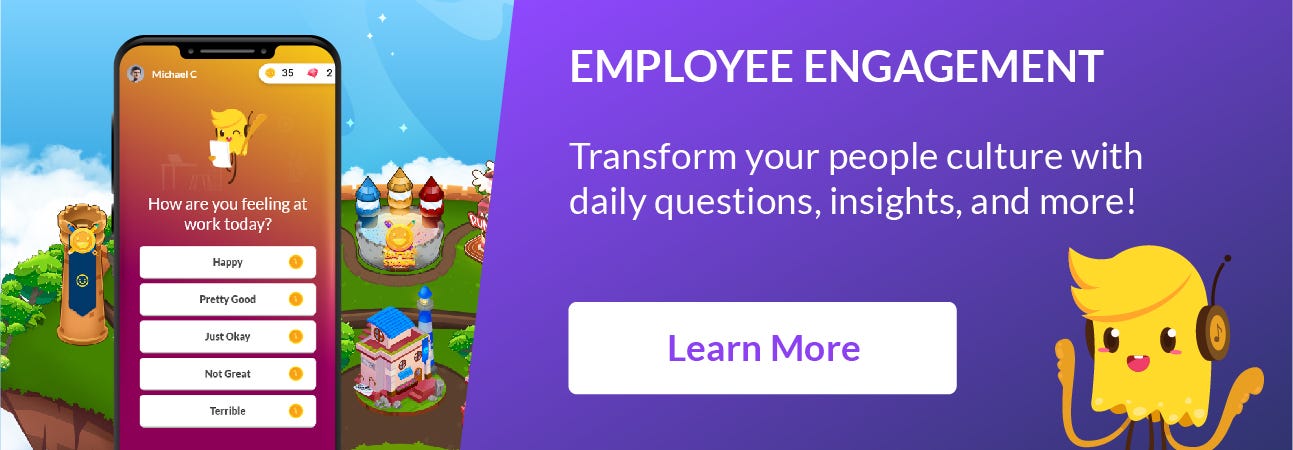What is Employee Recognition?
People are the most important asset in any organization. Business and HR leaders are constantly trying to maximize employee productivity, job satisfaction, engagement, and well-being—recognition is a tool that can do it all. Recognition is shown to reinforce positive behavior and motivate top performers.
Recognition has always been a top-down activity, adding strain on leadership to reinforce positive behaviors with limited visibility. Happily.ai puts the power of recognition in the hands of employees. We’ve studied recognition in over 4,000 employees across several companies to dive deeper into how and why recognition makes employees feel more valued, and engaged, at work.
Check out 5 studies that showcase why recognition is important, the effect recognition has on performance and productivity, and practical insights on how to facilitate recognition in your workplace.
Why Employee Recognition Matters:
1. The Incredible Effect of Recognition on Employee Happiness
Happier employees are more productive, confident, and are more likely to stay longer in an organization. Our recognition and happiness data from 4,445 employees collected through Happily Recognition and daily pulse surveys show that not only does recognition increase employee happiness, but the majority of happy employees are always recognized by others. Here are three key ways to encourage recognition in your workplace and make your employees happier.
2. Do We Tend to Give Recognition to Those Who are Most Similar to Ourselves?
Diversity in teams is important, members who are different in background, expertise, ideas, strengths, and challenges. We study the recognition behaviors of people categorized according to the 3P Work-Style Framework, popularized by Professor Simon Johnson at MIT Sloan School of Management. Most people give recognition unbiased, but those who are process or detail oriented tend to recognize those more similar to them (i.e. those who are detailed appreciate the detail of others). Learn how different styles and types of work impact level of recognition to better understand yourself and your co-workers.
3. As a Leader, Why aren’t You Getting the Recognition You Deserve?
Recognition should not be limited to a top-down exercise. What began as a leadership-driven exercise has remained as such, confirmed by our studies. The higher you are positioned, the less likely you will get recognized. Interestingly, our research suggests that this has less to do with the leaders themselves but more with the work culture. Find out why managers and leaders are much less likely to get recognized and what you can do to make sure they are rewarded fairly.
4. Activate Your Talent with Regular Feedback and Recognition
Great leaders know how to activate their talent. Talent activation helps leaders realize the full potential of their employees, build trust, and create mutual growth. Giving your employees the opportunity to share feedback and give recognition are two essential ways to activate your talent. Learn more about the benefits of talent activation and the techniques that help your employees reach their full potential.
5. Recognition is the Gift that Keeps on Giving
Creating a culture of recognition is not easy. Effective recognition software can reduce the upfront and ongoing effort and increase employee engagement and productivity. We studied the recognition behavior of 246 employees and found that the act of receiving recognition triggers the recipient to give recognition. This reinforcement of positive behaviors further builds trust and improves employee well-being. Find out more about building a company culture with recognition here.
The act of giving and receiving recognition is a high ROI employee engagement activity that creates immense short-term and long-term value, increases well-being, productivity, and more. Putting a recognition system in place to activate your talent and strengthen your culture. If you are interested to learn more about how we can help, visit Happily.ai.
Happily is a one-of-a-kind platform that drives unprecedented feedback, recognition, insights, coaching, and more. Visit our website to learn more, request a demo, and be on your way to activating your talent via recognition.

References
[1] https://blog.happily.ai/the-incredible-effect-of-recognition-on-employee-happiness/
[2] https://blog.happily.ai/do-we-tend-to-give-recognition-to-those-who-are-most-similar-to-ourselves/
[3] https://blog.happily.ai/as-a-leader-why-arent-you-getting-the-recognition-you-deserve/
[4] https://blog.happily.ai/activate-your-talent-with-regular-feedback-and-recognition/
[5] https://blog.happily.ai/recognition-is-the-gift-that-keeps-on-giving/










